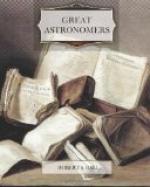Not satisfied with a career which should be merely scientific, Laplace sought to connect himself with public affairs. Napoleon appreciated his genius, and desired to enlist him in the service of the State. Accordingly he appointed Laplace to be Minister of the Interior. The experiment was not successful, for he was not by nature a statesman. Napoleon was much disappointed at the ineptitude which the great mathematician showed for official life, and, in despair of Laplace’s capacity as an administrator, declared that he carried the spirit of his infinitesimal calculus into the management of business. Indeed, Laplace’s political conduct hardly admits of much defence. While he accepted the honours which Napoleon showered on him in the time of his prosperity, he seems to have forgotten all this when Napoleon could no longer render him service. Laplace was made a Marquis by Louis XVIII., a rank which he transmitted to his son, who was born in 1789. During the latter part of his life the philosopher lived in a retired country place at Arcueile. Here he pursued his studies, and by strict abstemiousness, preserved himself from many of the infirmities of old age. He died on March the 5th, 1827, in his seventy-eighth year, his last words being, “What we know is but little, what we do not know is immense.”
BRINKLEY.
Provost Baldwin held absolute sway in the University of Dublin for forty-one years. His memory is well preserved there. The Bursar still dispenses the satisfactory revenues which Baldwin left to the College. None of us ever can forget the marble angels round the figure of the dying Provost on which we used to gaze during the pangs of the Examination Hall.
Baldwin died in 1785, and was succeeded by Francis Andrews, a Fellow of seventeen years’ standing. As to the scholastic acquirements of Andrews, all I can find is a statement that he was complimented by the polite Professors of Padua on the elegance and purity with which he discoursed to them in Latin. Andrews was also reputed to be a skilful lawyer. He was certainly a Privy Councillor and a prominent member of the Irish House of Commons, and his social qualities were excellent. Perhaps it was Baldwin’s example that stimulated a desire in Andrews to become a benefactor to his college. He accordingly bequeathed a sum of 3,000 pounds and an annual income of 250 pounds wherewith to build and endow an astronomical Observatory in the University. The figures just




